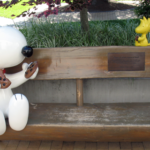Editor’s Note: Baylor University’s interim president, David Garland, delivered the following address at Baylor’s summer commencement. His words of biblical wisdom not only apply to university graduates, but also to students at all points on the academic spectrum as they begin the 2016-17 school year.
 David GarlandThe Apostle Paul uses athletic metaphors to talk about the Christian life: “Do you not know that in a race the runners all compete, but only one receives the prize? Run in such a way that you may win it. Athletes exercise self-control in all things; they do it to receive a perishable wreath, but we an imperishable one. So I do not run aimlessly, nor do I box as though beating the air;but I punish my body and enslave it, so that after proclaiming to others I myself should not be disqualified” (1 Corinthians 9:24-27).
David GarlandThe Apostle Paul uses athletic metaphors to talk about the Christian life: “Do you not know that in a race the runners all compete, but only one receives the prize? Run in such a way that you may win it. Athletes exercise self-control in all things; they do it to receive a perishable wreath, but we an imperishable one. So I do not run aimlessly, nor do I box as though beating the air;but I punish my body and enslave it, so that after proclaiming to others I myself should not be disqualified” (1 Corinthians 9:24-27).
Metaphors often break down if applied literally. Paul does not intend to compare the Christian life to competitive sport in the sense that one aims at outperforming others to the point that they endure the shame of defeat. That is contrary to the gospel. Nor does he want to reduce the Christian life to the lone athlete training and struggling by himself or herself in order to obtain some first-place prize.
Two points
He makes two points. First, simply entering a race and running does not automatically qualify one as a winner. … Like the athlete who goes through rigorous training, the follower of Christ also must undergo strenuous discipline, exercise self-control and develop the strength, the grit, the tenacity to reach the ultimate goal.
The athletes at the famous Isthmian games, hosted by Corinth in the first century, received a paltry crown of celery to commemorate their victory. It would soon wilt and wither into dried-up flakes. It was a deliberate reminder of how ephemeral athletic triumphs are. People would laud the victors for a time and then forget. Athletic triumphs do not last.
Paul’s second point is Christians enter a race in which the prize is imperishable and eternal. If one would train this hard to win a crown of celery, how much more should you knock yourself out for something of eternal worth?
Greatness is to be found …
I have not carefully researched it, but I believe in your years at Baylor, our athletic teams have had the best records of any generation in the long Baylor line. We are committed to excellence in all that we do—athletics, academics, research—but the greatness of this university is not to be found in its athletic won-loss records, its trophies, not even its beautiful facilities.
Sign up for our weekly edition and get all our headlines in your inbox on Thursdays
The greatness of this university is to be found in you, the soon-to-be-graduates of Baylor University. It is to be found in the dedicated faculty, the devoted staff who do so much work behind the scenes, the dutiful alumni who have been successful in so many ways and stand for and with Baylor.
In Paul’s metaphor, he talks about only one winner of the contest. That may be true in the sports arena, but not in life, and certainly not today in this ceremony. You all are winners. The fact you are soon to walk across this stage when your name is called says something about you.
Everyone in the audience is focused on a particular graduate, your shining star, and your shining star’s friends that you have met and for whom you will also be cheering. … But we are here to celebrate every one of you. You made it. You are winners today.
How many of you failed at something during your time at Baylor? Yet here you are. Recognized as a winner when you come across this stage with people cheering for you and some crying tears of joy. You do not have to be the winner to be a winner.
Great reward
I do not know who won the 1986 New York City Marathon. I do know the name of the guy who finished last: Bob Wieland. He finished 19,413th and set a record. He completed the NYC Marathon in 4 days, 2 hours, 48 minutes and 17 seconds. Stephen J. Lawson’s Men Who Win: Pursuing the Ultimate Prize tells the story of the slowest marathon runner in history. Why remember this? He had to run with his arms. He lost his legs in Viet Nam. When he ran, he sat on a 15-pound saddle, covered his fists with pads, and ran entirely with his arms. Wieland finished the race four days after the start. What did it matter? Why bother to finish? Here’s why: There is great reward in just finishing the course.
You have finished this course in the race. But you cannot rest on your laurels. You cannot hang up your diploma and sit back and let the world come to you. You cannot congratulate yourself on running four laps well in a 60-lap race, in fact, a race that will not end until God calls you home. …
I hope you have learned some things here at Baylor for the next legs of your race. I hope you have learned how to discipline yourself to achieve your goals, how to exercise self-control. I hope you have developed the strength, the grit, the tenacity to handle whatever life throws at you. Parents may sometimes worry about whether your major will get you any kind of a job. Recent survey showed 93 percent of employers agree “a candidate’s demonstrated capacity to think critically, to communicate clearly, and to solve complex problems was more than a candidate’s undergraduate major.” You need to be able to think critically, communicate clearly and solve complex problems.
Cliché inversion
Some in a commencement audience play “commencement bingo.” When speakers use one of the many commencement clichés, you check them off on your bingo card. I scoped these out so I could use a few of them for you, but I would like to modify them:
• “Be your own person.” We are all fallen creatures, so I would say strive to be like Jesus.
• “Follow your dreams.” I would say instead follow God, and I promise you that God will take you to places and people you never could have dreamed.
• “Make your own story.” I would say instead become part of God’s story. I promise you that it will end better in the long run.
• When you fail or fall as we all do, individuals or institutions, the commencement advice is “Get up, dust yourself off, move on.” But I would say this:
You need Someone greater than you to pick you up and dust you off.
You need Someone greater than you who will take you through the times of failure.
You need Someone greater than you who will take you through the times when your embarrassments are flashed across the airwaves.
You need Someone greater than you who will take you through the times when death hits you in the gut.
You will need Someone greater than you who will strengthen you to get back in the race and move on.
You need Someone greater than you to tell you some races in life are not worth running.
You need Someone greater than you who will guide you on the right path.
David Garland, interim president of Baylor University, is professor of Christian Scriptures and former dean at Baylor’s George W. Truett Theological Seminary.














We seek to connect God’s story and God’s people around the world. To learn more about God’s story, click here.
Send comments and feedback to Eric Black, our editor. For comments to be published, please specify “letter to the editor.” Maximum length for publication is 300 words.